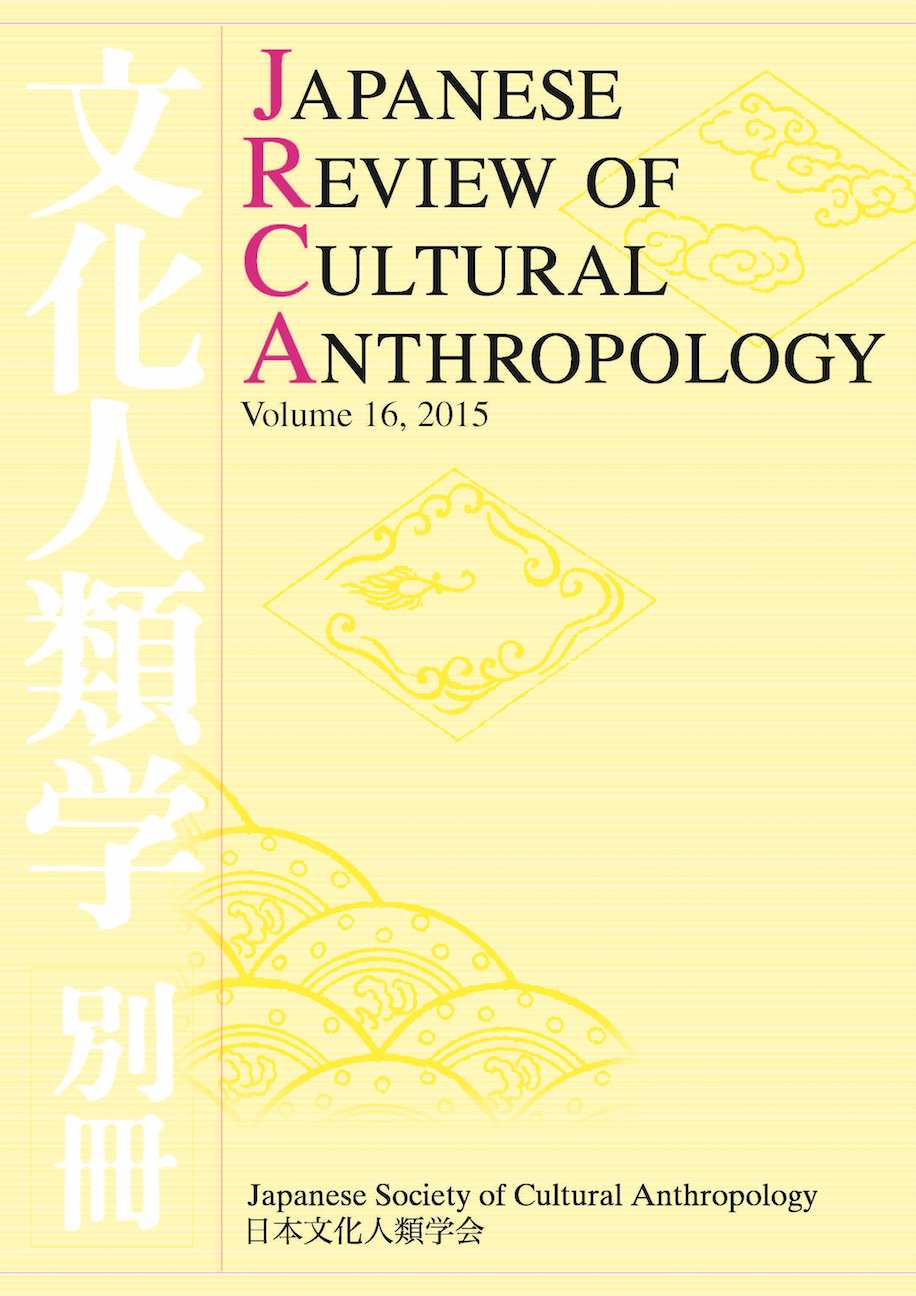20 巻, 2 号
選択された号の論文の28件中1~28を表示しています
- |<
- <
- 1
- >
- >|
front matter
-
2019 年 20 巻 2 号 p. cover1-
発行日: 2019年
公開日: 2020/12/04
PDF形式でダウンロード (904K) -
2019 年 20 巻 2 号 p. 5-6
発行日: 2019年
公開日: 2020/12/04
PDF形式でダウンロード (312K)
Submitted Articles
-
2019 年 20 巻 2 号 p. 7-25
発行日: 2019年
公開日: 2020/12/04
PDF形式でダウンロード (554K) -
2019 年 20 巻 2 号 p. 27-62
発行日: 2019年
公開日: 2020/12/04
PDF形式でダウンロード (647K) -
2019 年 20 巻 2 号 p. 63-105
発行日: 2019年
公開日: 2020/12/04
PDF形式でダウンロード (817K)
Research Note
-
2019 年 20 巻 2 号 p. 107-132
発行日: 2019年
公開日: 2020/12/04
PDF形式でダウンロード (655K)
The 5th JASCA International Symposium The Internationalization/Globalization of Anthropology in East Asia: Taiwan and Japan
-
2019 年 20 巻 2 号 p. 133-143
発行日: 2019年
公開日: 2020/12/04
PDF形式でダウンロード (456K) -
2019 年 20 巻 2 号 p. 145-161
発行日: 2019年
公開日: 2020/12/04
PDF形式でダウンロード (496K) -
2019 年 20 巻 2 号 p. 163-201
発行日: 2019年
公開日: 2020/12/04
PDF形式でダウンロード (770K) -
2019 年 20 巻 2 号 p. 203-215
発行日: 2019年
公開日: 2020/12/04
PDF形式でダウンロード (453K) -
2019 年 20 巻 2 号 p. 217-226
発行日: 2019年
公開日: 2020/12/04
PDF形式でダウンロード (449K) -
2019 年 20 巻 2 号 p. 227-235
発行日: 2019年
公開日: 2020/12/04
PDF形式でダウンロード (451K) -
2019 年 20 巻 2 号 p. 237-241
発行日: 2019年
公開日: 2020/12/04
PDF形式でダウンロード (397K)
JJCA (『文化人類学』) Vol.84-3 Extended Summaries
-
2019 年 20 巻 2 号 p. 243-250
発行日: 2019年
公開日: 2020/12/04
PDF形式でダウンロード (457K) -
2020 年 20 巻 2 号 p. 251-256
発行日: 2020年
公開日: 2020/12/04
PDF形式でダウンロード (436K)
Special Issue “ Designing an End-of-Life Care Culture in Contemporary Japan ”
-
2019 年 20 巻 2 号 p. 257-264
発行日: 2019年
公開日: 2020/12/04
PDF形式でダウンロード (426K) -
2019 年 20 巻 2 号 p. 265-270
発行日: 2019年
公開日: 2020/12/04
PDF形式でダウンロード (405K) -
2019 年 20 巻 2 号 p. 271-277
発行日: 2019年
公開日: 2020/12/04
PDF形式でダウンロード (442K) -
2019 年 20 巻 2 号 p. 279-286
発行日: 2019年
公開日: 2020/12/04
PDF形式でダウンロード (422K)
JJCA (『文化人類学』) Vol.84-4 Extended Summaries
-
2019 年 20 巻 2 号 p. 287-292
発行日: 2019年
公開日: 2020/12/04
PDF形式でダウンロード (407K)
Special Issue “Dynamics in the Indexical Process of Signification: Perspectives form Linguistic Anthropolgy”
-
2019 年 20 巻 2 号 p. 293-297
発行日: 2019年
公開日: 2020/12/04
PDF形式でダウンロード (400K) -
2019 年 20 巻 2 号 p. 299-305
発行日: 2019年
公開日: 2020/12/04
PDF形式でダウンロード (459K) -
2019 年 20 巻 2 号 p. 307-313
発行日: 2019年
公開日: 2020/12/04
PDF形式でダウンロード (454K) -
2019 年 20 巻 2 号 p. 315-323
発行日: 2019年
公開日: 2020/12/04
PDF形式でダウンロード (430K) -
2019 年 20 巻 2 号 p. 325-331
発行日: 2019年
公開日: 2020/12/04
PDF形式でダウンロード (414K) -
2019 年 20 巻 2 号 p. 333-337
発行日: 2019年
公開日: 2020/12/04
PDF形式でダウンロード (403K)
back matter
-
2019 年 20 巻 2 号 p. 339-341
発行日: 2019年
公開日: 2020/12/04
PDF形式でダウンロード (84K) -
2019 年 20 巻 2 号 p. cover2-
発行日: 2019年
公開日: 2020/12/04
PDF形式でダウンロード (194K)
- |<
- <
- 1
- >
- >|
